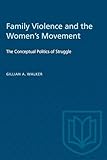Family Violence and the Women's Movement : The Conceptual Politics of Struggle / Gillian A. Walker.
Material type: TextSeries: HeritagePublisher: Toronto : University of Toronto Press, [1990]Copyright date: ©1990Description: 1 online resource (270 p.)Content type:
TextSeries: HeritagePublisher: Toronto : University of Toronto Press, [1990]Copyright date: ©1990Description: 1 online resource (270 p.)Content type: - 9780802067821
- 9781487574314
- 362.82/92/0971 22
- HV6626.23.C2 W35 1990eb
- online - DeGruyter
| Item type | Current library | Call number | URL | Status | Notes | Barcode | |
|---|---|---|---|---|---|---|---|
 eBook
eBook
|
Biblioteca "Angelicum" Pont. Univ. S.Tommaso d'Aquino Nuvola online | online - DeGruyter (Browse shelf(Opens below)) | Online access | Not for loan (Accesso limitato) | Accesso per gli utenti autorizzati / Access for authorized users | (dgr)9781487574314 |
restricted access online access with authorization star
http://purl.org/coar/access_right/c_16ec
Feminists have always perceived wife abuse as just one of many manifestations of the unequal division of power between men and women. But as public awareness of the issue grew, government agencies began to take the issue over. They redefined wife-battering as a social problem for which professional and legislative responses were appropriate solutions. They ignored its connection to more fundamental questions of male power. Gillian Walker systematically and empirically examines the process by which the issue of wife-battering was taken away from feminists and the women being abused. She has combined her own first-hand experiences as a feminist activist with a careful analysis of documents and with interviews of participants in various federal and provincial conferences and hearings. From this she shows how the experience of wife abuse became defined as part of the broader issue of family violence. The women who together started and shaped the transition-house movement today find their status changed. They are directed away from political action. Instead they are expected only to provide services in crisis shelters, increasingly monitored and under-funded, part of a broader network of services to 'troubled families.' Meanwhile, society fails to address the question of gender inequality as the root cause of wife-battering. Walker's analysis of the conceptual processes involved in naming an 'issue' and defining a 'social problem' offers insights into the politics of social action generally. It speaks to the struggles of all grassroots activists.
Mode of access: Internet via World Wide Web.
In English.
Description based on online resource; title from PDF title page (publisher's Web site, viewed 01. Nov 2023)


